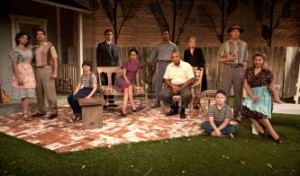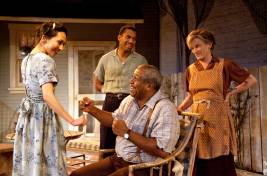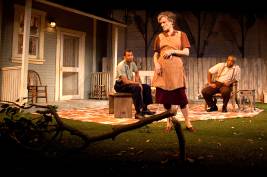
It’s been nearly sixty-five years since Broadway audiences first thrilled to Arthur Miller’s All My Sons, decades during which countless actors have put their stamp on the now iconic roles of factory owner Joe Keller, Joe’s son Chris, Chris’s fiancée Ann Deever, and Ann’s brother George. It’s a sure bet, however, that few if any of them have ever looked like Alex Morris, A.K. Murtadha, Linda Park, and James Hiroyuki Liao—and for obvious reasons. The Kellers and Deevers are Caucasian. Morris, Murtadha, Park, and Liao are not.
To be sure, race-appropriate casting makes perfect historical sense in a period piece like All My Sons. That being said, theater is by its very definition a sort of alternate reality, making the Matrix Theatre Company’s non-traditional casting of its brilliant All My Sons revival a perfectly sensible decision as well.
Not that there won’t be those who will protest, and rightly so, that Arthur Miller never intended for his play to be “an examination of race in America,” which is how producer Joseph Stern has described this production, mistakenly I believe. Another legitimate complaint would be that that Stern’s decision to cast the Kellers as (in his words) “a mixed race family—Joe Keller is black, Kate Keller is white, and son Chris is biracial”—is a form of revisionist history, one that denies the realities of race relations at the time Miller wrote this play.
I prefer simply to consider the Matrix Theatre ensemble an inspired example of colorblind casting, taking one of the truly great plays of the 20th Century and affording a rainbow spectrum of actors the rare opportunity to portray some of the richest roles ever written for the American stage. See All My Sons with colorblind lenses and you have a truly remarkable production, and one which makes Miller’s themes all the more universal and relevant to this 21st Century world.
And trust me. Not only do Morris, Murtadha, Park, and Liao fit their All My Sons roles to a T in every way but racially, the entire cast’s performances rank among the finest you will ever see. (I speak from experience, having seen six previous productions.)
Debuting on Broadway less than two years after World War II ended with Japan’s surrender, Miller’s examination of personal responsibility in time of war remains every bit as powerful and relevant in 2011 as it did in 1947.
Miller’s Tony Award-winning drama centers on a day in the life of the Kellers, a Midwest family who seem from the outside to be living the American Dream. At curtain up, prosperous factory owner Joe Keller (Morris), his wife Kate (Anne Gee Byrd), and their adult son Chris (Murtadha) are welcoming a visit from grown up next door neighbor Ann Deever (Park), back in town for the first time since moving to New York several years earlier. Ann and the Kellers’ older son Larry were an item when Larry went off to war, but the elder Keller boy was declared missing in action three years ago, and there has been no word of his fate. Though Kate steadfastly refuses to believe that Larry is dead, Ann apparently feels quite differently about the matter. She and Chris have been corresponding secretly for the past two years, and Ann’s return home signals a change in their relationship. Friendship has turned to long distance love, and Chris is planning to propose to Ann. There’s only one hitch. An engagement between Chris and Ann would mean a tacit acceptance of Larry’s death, and this is something which Kate will never do.
There’s one other stumbling block to the young couple’s potential happiness together. Ann’s father (and Joe’s business partner) Steve was sentenced to prison three years earlier for having knowingly sent out a shipment of defective airplane parts from Joe’s and his factory, cracked cylinder heads which led to the deaths of twenty-one pilots. Joe had initially been found guilty as well, however his insistence that he was home sick in bed the day the order got shipped out, corroborated by Kate, soon relieved him of any responsibility for the plane crashes, and he was subsequently released from prison.
When Ann’s brother George (Liao) shows up on the Kellers’ doorstep following a prison visit with his father, the stage is set for a two-family showdown which will forever alter the path of Chris Keller’s life and the lives of those he loves.
All My Sons works brilliantly on many levels—as a story of family, as a love story, as a mystery, and as a discussion starter. Even more than six decades after its premiere, All My Sons’ questions still ring true. Does a person’s responsibility to his family trump his responsibility to his country? Does war bring out the worst in people, or their best? Can a person go on living without self respect or the respect of others?
As its secrets are revealed, All My Sons becomes steadily more engrossing. Expect to gasp. Expect to cry. Expect to be moved profoundly by this truly great work of American theater—particularly as directed by the brilliant Cameron Watson, who having never seen a production of All My Sons, approaches the masterpiece with brand new eyes—and this fresh, original approach shows in his cast’s unforgettable performances.
Morris brings a quarter century of much lauded work (he won L.A.’s Ovation award for his superb performance in Jitney) to the role of Joe Keller, one which he plays with explosive power and oceans of depth. Byrd proves once again as Kate why nearly every one of her performancea is welcomed with award nominations galore. The L.A. stage star’s steely, controlled work as the steely, controlling Kate is positively riveting, and never more so than when we watch helpless as the matriarch’s world unravels before her eyes. Murtadha is an absolutely wonderful Chris, making us believe in his idealism, his passion, and his ultimate disillusionment. An impressive Park makes Ann everything an Ann Deever should be, tough, determined, and passionately in love.
Supporting the above quartet is the splendid work of Taylor Nichols as good-natured neighbor Jim Bayless; Armand Vasquez, an earnest, understated Frank Lubey; Maritxell Carrero, perky perfection as Lydia Lubey, and Taylor Scofield, a charmer as wide-eyed neighbor boy Bert. I’ve had reservations in other productions about the ways some of these roles were performed. I have none whatsoever about the performances on the Matrix stage.
Finally, there is the truly stellar work of Liao as George and Anita Barone as neighbor Sue Bayliss, performances which make it crystal clear why these are two of the absolute best supporting roles in the Arthur Miller oeuvre. Liao’s work here is a revelation, particularly to a reviewer who has expressed reservations minor and major about previous Georges. With the intensity and depth of a young Brando, Liao grabs your heart from his first appearance as Ann’s angry, guilt-ridden brother and never lets go. Unlike others before him, the native Brooklynite’s performance is never forced, never less than authentic, and when he allows George to once again feel the Kellers’ warmth, the transformation is stunningly achieved. Like Liao, Barone makes the absolute most of her every Sue moment, earning laughs where others may have played it too dark, giving the character an outward sunniness that makes her digs all the more piercing. Simply put, Barone’s is one of the very best Sues ever.
A phenomenal design team makes this All My Sons look and sound absolutely terrific. Scenic designer John Iacovelli takes full advantage of the wide Matrix stage, giving us the façade and porch of the Keller home and an ample lawn and rocker-for-two for the cast to perform on. Like this production, Iacovelli’s set is both realistic and fanciful, and it works. Marcy Froehlich has costumed the cast to late 1940s perfection, and propmaster Chuck Olsen deserves kudos as well. Steven Cahill’s sound design ups the dramatic ante along with providing various authentic sounding effects. Brian Gale lights this all with consummate artistry (and some stunning fadeouts).
Jami Rudofsky is casting director, Gil Tordjman stage manager, and Allain Rochel managing director.
My advice to all lovers of great L.A. theater is as follows. Lay all reservations aside and let the performances of this magnificent cast give you an All My Sons like never before. Whether discovering Arthur Miller’s masterpiece for the first time or rediscovering it for the umpteenth, this is an all-around brilliant production, and one most definitely not to be missed.
The Matrix Theatre, 7657 Melrose Ave., Los Angeles.
www.matrixtheatre.com
–Steven Stanley
October 22, 2011
Photos: Karen Bellone





 Since 2007, Steven Stanley's StageSceneLA.com has spotlighted the best in Southern California theater via reviews, interviews, and its annual StageSceneLA Scenies.
Since 2007, Steven Stanley's StageSceneLA.com has spotlighted the best in Southern California theater via reviews, interviews, and its annual StageSceneLA Scenies.







 COPYRIGHT 2025 STEVEN STANLEY :: DESIGN BY
COPYRIGHT 2025 STEVEN STANLEY :: DESIGN BY